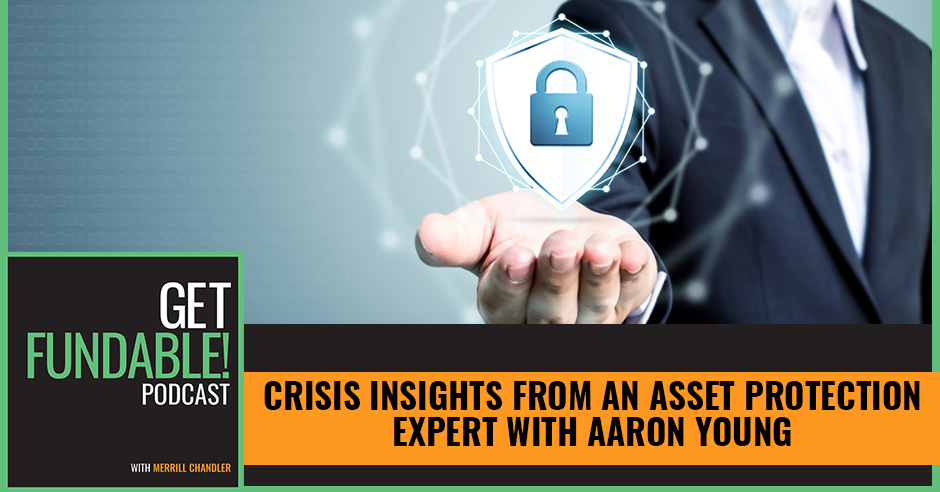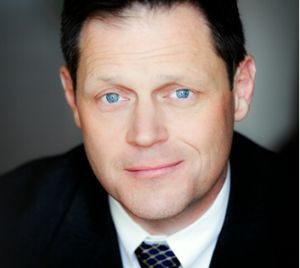
Many people are on a mission to accrue as much wealth as they can secure for themselves, but they don’t realize that they should start by answering the question of how they can protect that wealth. Asset protection is often neglected in the discussion of acquiring wealth, but that has to change. Merrill Chandler is joined by Aaron Young, an asset protection expert. Together, Merrill and Aaron illustrate some of the best tips and techniques for protecting the wealth you’ve worked so hard to build. Get on these strategies as soon as possible because you’ll never know what could happen in times of crisis.
—
Watch the episode here:
Listen to the podcast here:
Crisis Insights From An Asset Protection Expert With Aaron Young
Are You Prepared?
I have a great luxury because we live on a farm. It’s not like I’m stuck in an apartment somewhere in downtown. We’ve got 25 acres to go wander around, mess with the animals, listen to little birds, go down to the stream, and go to the pond.
Get the avian flu from some birds that are on your properties. That’s fair enough.
Anyway, it’s great. It’s quieter time but it’s given us a lot of opportunities as a company or as a group of companies to think about what does all this means or what opportunities can be found which I’m sure we’ll spend time talking about.
I want to get to that. Part of the reason why I was excited to have you on in my podcast, I’m picky about who I bring in to share because everything I do is about fundability™, making sure that your business, your personal life, you have the tools necessary to leverage, your greatest asset, which is your reputation. You are the business equivalent of what I do for funding. How do you maintain your business reputation? How do you keep it bulletproof? I can’t wait to get it for everybody. We have eight different channels that are going to be enjoying this conversation. First of all, tell me a little bit about you and how you got Laughlin Associates as well as your commitment to your Magnify Your Wealth. It isn’t protecting but then expanding and growing. Share with us your journey and how you ended up here now that we’re all in sequester mode.
I came home for Christmas for my one and only year of college and I didn’t have any money. I did something that we had done as Boy Scouts, which was go out and collect old newspapers. I borrowed a pickup truck from somebody at church, drove around, picked a bunch of old newspapers. This was Christmas 1982. As an eighteen-year-old with a borrowed truck in 1982, in a matter of a few days, I made about $3,000. I thought that’s more money than my dad makes. That’s a month, not in a few days. I went back to school and along with a friend, we organized a flyer and a route book. We mapped out the city of Portland, Oregon. We went back home after school at the end of April. We started blanketing the city with these flyers and we started picking up these old newspapers. Before you know, we had about 5,000 monthly clients and then we start adding other things. We had another truck and some more guys. Before I was nineteen, I had three people on payroll and two trucks. I grew up in the Mormon Church, went away on a Mormon mission and the business operated the whole time I was gone for a couple of years.
A passive income as a nineteen-year-old.
Money was going into the bank for me. I got home and I resumed my involvement for a little while. I met this super cute girl that I’ve now been married to for years. I thought she doesn’t want to be married to a garbage man. I sold my part of the business to the other guy that I was involved with and went out and bought my first inventory of cellular telephones. I became one of the first cellular phone guys in the Northwest back in 1986. That whole industry changed after I’d been in it for about 5 or 6 years. This is something important for everybody to read. In one meeting with these higher ups at the carrier, GTE Mobilenet, which would now be like Sprint or Verizon or whatever, they changed the entire nature of our business. They took away our commission structure, co-op advertising structure, how fast we got paid on things, how they would help fund or how they would carry paper on the phones like flooring for an appliance or a car lot.
All the stuff was effective at the meeting, not 30 days. As a young entrepreneur thinking I’m big compared to some of these guys, I’m in the newspaper and the radio, we’ve got multiple stores, I’m kicking butt, bought two different houses and moved up twice, driving new cars and I thought, “I’m cool.” This was one of the great business lessons of my life. Thankfully it happened when I was young. All the guys with a little bit of gray hair, they all closed up shop, but not me. I stayed in. Before you know it, I’d used up all the cash, the business credit line, my personal credit cards and HELOC on my home. I’m hundreds of thousands of dollars upside down with no way out. I’m screwed.
With a completely different organizational structure, you can’t do business the same way you could.
One meeting can change the entire nature of your business #GetFundable Share on XWith my nine-month pregnant wife with our second child, she is sitting next to me in bankruptcy court as we declared bankruptcy. We had about eighteen months of trying to figure something new out which is what a lot of entrepreneurs go through. They don’t want to get a job. They want to go figure something out.
We recreate ourselves. Everybody who’s reading, how many times have you recreated yourself? It’s part of our DNA.
I started a couple of things that worked but didn’t work well-enough. One day, this guy that I knew, he was a member of our church, but he was in a different congregation. He calls up and says, “Aaron, can I take you out to lunch?” All I knew about him was that he was I thought rich because he had a lot more than me. He has not a brand-new Suburban, which in the Mormon Church, if you have a brand-new Suburban, that was cool because we all have all these kids. We go to lunch and he said, “I’m sorry to hear about your business having trouble. Would you be interested in having a job?” Here I am, I had crappy grades in high school. I went to one year of junior college, I’ve been working in two businesses that I had started and by my own wits, had made work. One had completely failed at the end, and I was saying no fault of my own but it was my fault because I didn’t get out.
You weren’t reminded yet of the cycle about this.
I didn’t know how it worked yet. It was my first time facing a hard time. He offers me and I said, “What’s the job? What’s the company?” He said, “We’re publicly traded. We’re NASDAQ. We have about 350 offices around the world. We’re growing.” I said, “What job are you offering me?” I felt utterly unworthy of a job. He said, “I’d like to hire you to be our vice president of sales.” I was like, “What are you talking about?” A vice president of a public company. I was 29 years old when I started that job. I did for 3.5 years, I made a lot of money in stock and left there on good terms. They even kept me on. I quit one day on a whim. I stayed on for another year on a contract with them. I started what we’re doing now. I made a lot of money in stock so we started buying 5, 6, or 7 companies. The opportunity to buy Laughlin Associates was presented to me. We bought it. I’ve continued to do that, but Laughlin was what I wanted to keep. My business partner, Lee Morgan and I, have now had it since 2001. We went through that. We came in right at the end of the dot-com burst. We rode a real estate up and then crash and then up again. We’ve gone through that and now we have COVID. We had a big battle with the IRS early in that game starting in ‘03 and ending in ‘07, which was another hardship.
I would love to say what we learned in the process of cycles because that’s what I want to address. You have so much experience on how to protect from the cycle.
It’s reasonable then to add this one thing without going into it and without freaking everybody out. In 2002, the IRS and the FBI raided our office along with a bunch of other places around the country seeking information about somebody we had done a lot of business with. That’s what they were hitting all these places simultaneously. They arrested him at the same time. We were not named in that lawsuit. We had stopped working with him a couple of years before and so they were saying, “This guy has been so tricky to figure out. Would you mind answering some questions?” I said, “Sure.” I thought that was the right thing to do. The bottom line is I answered their questions and four months later, my partner and I were indicted on conspiracy and they said, “You either knew or should have known.”
They later admitted that they knew we didn’t know but because we had materially assisted filing some companies for him, we were sucked in. After $2 million in legal fees, we finally gave up, took a plea bargain and went to prison for eighteen months. We served fourteen months and part of it is good time and part of it is probation. I’ve been through that early company failure, through the dotcom failure, through Black Monday which was in the ‘80s. I’ve been through the rise and fall of the real estate market, fighting the government and going to prison. If you build a company that is a real company, it will operate even when you’re not there. The year that I was in prison, I still took home $974,000. The Feds got a lot of money too. The point is we’ve gone through all these cycles and now we’re in what I believe is the early stage of this cycle. Not that we’re going to be quarantined forever or social distancing.
The effects of the quarantine are going to have a powerful impact.

Asset Protection: If you build a company that is a real company, it has to be able to operate even when you’re not there.
The world as we knew it will not go back to what we had before any more than it did before 9/11, than it did before the internet arrived in the mid-‘90s. The world will be fundamentally changed. I’m looking forward to your questions and hope to be able to provide some perspective.
First of all, thank you. You’re one of my heroes because we’ve shared that same experience of being at cause building an empire 2 or 3 times and being at effect. As you said, there’s always a bigger fish and we ultimately have to play the game well enough so that we can protect ourselves. The purpose of our time together here is I want to discuss your read on pace. We’ve never had a health pandemic turn us into a recession. It’s always been a financial, some collapse, mortgage has got the rugs pulled out or whatever it was. Before we go into helping our audience understand what’s next and how to prevent, what do you see over the next month, 3, 6 months? What do you notice from your experience? We’ve shared this roller coaster ride a couple of times. What do you see coming?
I’m not saying I was unique in this prediction, but this was my anticipation of what we were gearing up for. I assumed it would be some time after the next election. I had been anticipating interest rates going up, further tariffs on trading partners, which would increase cost of goods as companies were trying to ramp up here. All of a sudden, your t-shirts that were made in Bangladesh are going to cost 2 or 3 times as much because they’re made in Iowa. I thought between rates going up and costs of goods consumables going up, it’s going to slow the economy down on purpose so we don’t have a runaway inflation. I thought there will be a reset in the market. I thought at that time, it won’t be like ‘08. In my opinion, it would be focused on high paying warehouse jobs, places where humans are doing a lot of physical work with equipment.
I thought when those companies have to shrink down a minute, they’re going to going and take that opportunity through private equity money or through selling shares to increase their use of robots and Artificial Intelligence. I also thought bookkeeping companies, a lot of people in the accounting industry, things that can be automated would be automated, similar to what you’ve seen in automotive factories and so on. That’s coming down the road and that will be an opportunity. Remember, I’m also in private equity. I’m still buying companies and taking companies public. That’s going to happen and we’re going to have a great opportunity if you’re in a position to be a buyer. If you’re forced to be a seller, we would be able to provide an exit for people without them closing up shop. What’s happened with the pandemic is it brought to our doorstep the beginning of that. You see a bunch of Amazon workers walked out. Whole Foods did a sick out or whatever they call it, and Whole Foods is owned by Amazon.
They’re the people I’m talking about at Amazon, relatively highly paid warehouse people and they already have a lot of robots and a lot of AI. You can bet Jeff Bezos and the rest of the kingpins out there are only going to tolerate this so far. Before they make capital investments to get rid of those people and have one person who can fix the machine that does the work of 10 or 20 people. What’s happened is that’s accelerated. What’s the result of that? A lot of jobs will be lost. There’s a lot of restaurant workers and that thing out of business or out of work right now. That’s unfortunate but some of those are lifetime career, some are transient. People will move in and out of it as they need it but you’re going to see a lot of these people who’ve been working somewhere for 5, 10, 15, 20 years, got money in a 401(k), they’re going to lose their jobs. They’re going to learn about self-directing their 401(k) and we’re going to see an explosion of micro-businesses.
An explosion of the micro investor into a number of different things who now want to take a shot in relative control over their own lives.
They don’t need to get rich. They just need to take care of themselves. Some of them will invest in traditional things like real estate. They have more money, maybe oil and gas. Oil and gas are great investments because you can write it off. You don’t have to take it with post-tax money and write the freaking investment off but a lot of people will do franchises. They’ll start putting in mini blinds and countertops. They’ll do closet organizers and all these things we hear on the radio. There will be all these little micro businesses. The other thing that’s happening now is everybody freaked out about, could they go virtual? We’re going to see a lot of shaking out.
Does somebody have a place to sit at home? Do they have a dining room table where the dog’s not showing up on a Zoom call with a client or on a phone call? Do they have enough broadband to function over the internet? There are going to be these things that are going to shake out. The struggles that come from shaking out will create new opportunity with technology and the companies that can’t hold on will go out of business. The ones that can stay on will have a great opportunity to buy at fire-sale prices which, going back to what you do, is a great reason to have available lines of credit, discretionary spending available.
If you have anything at all to protect, strongly consider getting a corporation or LLC #GetFundable Share on XYou and I also share this and implemented it in my own life, a devotee of the idea that opportunities and limitations or disasters come in pairs. You cannot have one without the other. You can’t have an opportunity without a devastation or a limitation following at some point. You cannot have exactly what’s going on here without it being the breeding grounds for not Influenza, not COVID but breeding grounds for actual opportunity, new pivots. What you’ve been sharing, and one of my coaches shared this as well, is we have an opportunity to look at the truth of the situation and look for the opportunity. Look for the pivot because it’s there. To quote the good book, “Do we have eyes to see and ears to hear?” Can we even perceive what’s happening? Everybody seems to be trying to acclimate to being at home, working from home and more on isolation.
As you said, those that can do so will thrive. Some will survive and some will fail. Let’s get to that. You mentioned Laughlin was the company that you maintained and that you still have. You also have your Magnifying Your Wealth, the expansion model. You’re still taking care of your business, but how do you create to thrive? When I was coming to this, when I was making my notes on you, I was like, “I’ve been preaching thrive and survive for a minute now but Laughlin is about to survive and Magnify Your Wealth is about thriving.” Talk to our audience about some of the things to prepare for, how do we create a business that is going to weather the storm? How do we thrive? How do we survive and what tools do we have that we can give them to at least open that conversation up?
We’re redoing The Critical Twenty: 20 Critical Steps To Business Success. I wrote it a few years ago in one day because people were saying, “What do I need to know? What’s the fundamental part?” I thought, “Here’s how it works.” If anybody wants this book, you can go to AaronScottYoung.com. If you go to the bottom of the homepage, you can download a PDF of the book. It’s free. You’ll have to give your email. You can always unsubscribe if I mail you something.
They’re going to want more of what you’ve got. I’m telling you, this guy is a genius.
This book goes from, “Is your idea any good?” all the way through the life cycle of a business to where you replace yourself as the leader. You get out of the way of somebody who can now take it over as it’s grown beyond your skillset because a real company should outgrow you. If you’re in this moment and you’re wondering what do I do, you mentioned something great. Let me say this. A lot of people say follow your bliss, your passion and do something that you can be passionate about because when you love what you’re doing, you never work a day in your life. That’s silly in my opinion.
I enjoy what I’m doing but there are other things I enjoy too. I’d rather be horseback riding and sitting in a board meeting. I’m a big horseback guy. There are a lot of things I’d rather be doing that I’m more passionate about than my business. This is echoing to what you said, I believe we need to be dispassionate. We need to look at things in a Zen way which means with no attachment to good-evil, right-wrong, better-best. Look at the facts. What is happening? A lot of people are going, “What was me? What’s going on?” You said there’s opportunity. When we have a big problem, we have big opportunities. Most people will wring their hands. They’ll cry and go, “I can’t believe this stuff happens to me.”
“I’ve invested so much time and money into X when X was built for this circumstance. Now it’s Y, what are we going to build?” We’re creative engines.
What is X? Did X work? If X work, that’s great. Direct mail worked great before it was easy to advertise online. It got really easy to advertise online, then it got expensive to advertise online and people started going back to direct mail. I get a boatload of direct mail and it is starting to get more readers because people are deleting all their emails. Things change. We have to pivot with the times. If the way that you were addressing the market, the way that you are engaging with the market, if that doesn’t make sense in the current state of affairs, then step back. Instead of going, “What are we going to do?” go, “That message doesn’t work. That product or service doesn’t work right now.” You’re a cook in the kitchen. You’ve got all the same ingredients sitting on the countertop that you were using. How can you refashion those into a different casserole into something different?

Asset Protection: There are many corporations out there that haven’t done the proper corporate compliance work, so they don’t even know or realize that they’re out of compliance.
Let’s make a burrito because a burrito will fit this marketplace place, but it’s the same ingredients.
We’re out of burritos, so now we’re selling taco salad. That’s what it is. Instead of people going, “Everything I’ve built has turned to dust,” say, “Everything I’ve built has provided me with a bunch of assets.” Either physical, mental or social assets. You’ve got your social capital, email list, Facebook, LinkedIn, Instagram following.
You’re not going to go away during the pandemic. There’s an audience still that we have all developed to one degree or another.
A brilliant friend of mine, she’s got one of the top restaurants in Portland, Oregon. She was the sous chef at Le Cirque in New York when she was young. The number two person at Le Cirque, then she wanted to raise her daughter somewhere out of New York City. She came to Portland, Oregon and opened a restaurant. It’s one of the most popular restaurants in town. She had moved into a much larger space and hired more people, then remodel this old steakhouse to make it look like her place. All this work and then along comes COVID-19. They’re doing hand stuff off the curb. They’re doing delivery. There has been white-linen sit-down restaurant. They’re doing that. She has had the number one brunch/breakfast in the city voted on over and over again.
To get in there for brunch on a weekend, you might stand outside in the rain for 2.5 hours. She can’t serve brunch right now. What did she do Sunday morning? She did a Facebook Live and she showed how to make her number one dish for brunch, which is their Eggs Benedict. Here’s how we make it. She was showing everybody, “This is exactly how we do it.” She’s staying relevant where other people have disappeared. She’s lifting herself up in a way that says, “I’m still the bad-ass restaurateur than I was. We’re still open. You can come buy food from us and we’re going to bring food to you if you want us to.” She’s staying relevant while her competitors are shrinking into the mud.
In 2008, Tom Brad, my partner, we were doing exactly what we’re doing before in the run-up 2007, 2008 and making hay. The difference about this one is there wasn’t the infusion of capital at that time. Their moratoriums on payments and keeping your credit clean, all that stuff, was unheard of in 2008. Because the credit markets froze, we had all these clients who were a real estate investors. We’re in certain circumstances. We pivoted with exactly what you’re saying. All the tools, all of the mental awareness and all the people we had already built way more than client-student relationships with, these are people who depended on us for coaching and counsel on how to maximize their financial leverage. We started working in the foreclosure defense. We shifted over to foreclosure defense for our very clients who we had put into the homes. It’s seeing what opportunities are sitting here in front of us. Reviewing some of the points of your book, what does Laughlin do that allows you to set up and protect, even if the cow is out of the barn, our businesses from this onslaught? Let’s say we can pivot or we’re willing to look at new opportunities or possibilities. What would you tell them?
Everybody’s trying to be kind. They’re smiling at people. They’re keeping their distance. We’re not hugging and shaking hands but everybody’s being kumbaya. It’s like Christmas time. Everybody’s trying to be gentle and kind. There will come a point when there will be a lot of people that will want to blame somebody for their situation. To that end, I believe if you’re an employer for instance or if you’ve made contracts with people then you are having a hard time fulfilling on the contract, whether it’s making payments, producing goods and services or whatever it is, there’s going to be an explosion of lawsuits coming out of this. There’s going to be a lot of litigation. Most litigation never gets to court. The plaintiff buries the defendant in tons of paper. The plaintiff gets a lawyer to work on commission to come after the deep-pocket defendant business owner.
The defendant has to hire a lawyer at $400, $500, $600 an hour to answer the complaints and all the paper. At some point, the defendant says, “I give up. Let’s settle this.” A company that’s a properly structured corporation or LLC that’s done all of its corporate compliance work, which I would say 95% of the companies out there have not, they’re completely out of compliance and they don’t even know it. Years ago, I said something and it’s stuck in a lot of my talks. I say, “When you form that entity, when you form that LLC or that corporation, you get that corporate record book. If you don’t even have one, you’re upside down.” When you get the book and it’s got all those pages and stuff in it, you get it and you see all this stuff in it and you go, “I know I’m supposed to do something, but I don’t know what to do, so I’m going to do nothing.” That book goes on the shelf and gathers dust.
I’m going to prophesy that there’s going to be a significant number of our people who are reading, that will listen to podcasts for ages to come that are going to be like, “You don’t go to the Secretary of State or Division of Corporations. Fill out the one-page online app and then I’m good to do business. I’m solid.”
If you're organized, if you've been listening to Merrill Chandler, if you've become fundable, if you do that part right and you have your structural stuff, the stuff we do right where you're safe, where you've got an impenetrable wall,… Share on XYou haven’t done anything except for paying tax. That’s all you’ve done. They’ve said, “We’ll protect that name in our state. That’s yours. We know you’re there and we want a fee from you every year.” That’s it. You do not have a fully fleshed out corporation or LLC. You’re not in compliance. You don’t have an operating agreement and bylaws. You haven’t issued stock folks. If you have never issued yourself stock in a corporation or the membership certificate for an LLC, written your name on that certificate, filled up the stock ledger, issued it to you taking this certificate away and put it somewhere else, if you haven’t issued yourself stock, you do not own your company. There’s a sobering thought for I bet 98% of the people reading.
Part of the reason why you’re here is because I was that guy, an entrepreneur who says, “I need a legal framework in which to sell my goods and services hang out of a shingle.” I saw your presentation. We’ve been sharing the same Mastermind. I see and I heard those words come out of your mouth and I’m like, “Hold it.” It goes back like you see these movies where people have the paper of the stocks and they’re saying, “You own these things. They are worth something like cash dollar bills.” If you don’t have those, you don’t own the company. That was a frying pan to my head.
We think nothing of the fact that if we were going to go to a stockbroker and invest the money that we would own a certain number of shares. A lot of people do this with Disney shares or with Apple shares, especially Disney though because they’re real decorative. People ask for one share of stock. They might have 100 shares or 1,000 shares but they ask for one physical share so they can have it. In the digital market, when you’re publicly traded, they don’t send back and forth the papers every time. It’s all digital, but you can request your shares and you will get a certificate that says it’s worth this many shares. That is the only thing that proves that you own the company. I don’t care how long you’ve been paying the tax to your state, how many people you’ve employed or if you have a bank account, it doesn’t matter. Nobody else is checking. It’s only a few get sued, audited, trying to raise outside capital or trying to get a government contract when they ask to see that you’ve been operating a real business and not the shareholder’s alter ego.
I found out my LLC, which I’ve had for years, was the papered equivalent of a sole proprietorship where I’m the DBA, Doing Business As, alter ego just like you said. I knew I’m an illegal legal enough to know that was untenable the second I was aware of it. Here’s the thing. I have seven LLCs that I age myself when I’m ready to do something. I’m like, “When it becomes operational, it needs to have this thing.” We know we need to be at least defensible as the owner of an organization so somebody can’t sue it and we surrender and walk away from our hard work, assets or whatever. How do we then translate that protection model? As you said, if it starts getting a little more aggressive, people need somebody to blame, somebody point the finger up, what are other strategies that you have, you know or that you are preparing your own business for so that they can hear these new ideas and implement as well?
If you don’t have a corporation or an LLC, I would strongly consider getting one if you have anything at all to protect. There’s a great guy who was a tax lawyer, a CPA and an enrolled agent with the IRS. He’s name is Sandy Botkin. He’s written a bunch of books and he spoke in a lot of our events in years past. He’s retired now. Something that I would never say so blatantly, but he said, “You would have to be brain dead to not have a corporation.” There are thousands of deductions that a sole proprietorship cannot have in a C corporation. Depending on how your LLC is set up, if it’s a multi-member and reporting as a C, you can do what’s called a tax loss carryforward. If you have a bad year like we might have in 2020, you can carry those tax losses forward into the future up to twenty years.
It requires a certain level of, I don’t want to say sophistication, but awareness to set this up.
Consulting is always free at Laughlin. We can do a blueprint strategy, which we do charge for which says, “You have all these disparate assets or I’ve got revenue coming in from 3 or 4 different places. I signed up for an MLM and I’ve got $500 coming in. I’m working a W-2 job and I sell on eBay. I also own four rental houses.”
That’s exactly the vast majority of our readers.
We can do a blueprint strategy and look at all the pieces and say, “What do you need? Do you have more than you need? Do you not have what you need?” Our clients tend to stay with us for a very long time. We have 87% renewal rate, which is much higher than the typical rate of businesses that survive. Our clients stay in business a lot longer and they stay with us for a long time because we help them through all the stages. The way we do that is we don’t oversell them nor do we undersell them. We don’t say, “That $99 filing fee is all you need.” That’s a lie. There are a lot of companies out there that will take your money for doing nothing. Doing something you could have done for yourself. There are many website-driven businesses. They’re collecting dollars. They’re not consulting, helping, guiding and educating. Consequently, people will do the cheapest thing they can do and it’s never a problem until they get into some issue or a bad issue. We would love to talk to people if they want to talk to us.

Asset Protection: There are so many things that small business owners don’t know, including the hundreds of seemingly-minute things that need to be written down as board resolutions.
I’ve done it, and I’m telling you it was an eye-opener about not just ownership of the company but I am now prepared. Your guys come to me all the time. We have a quarterly meeting that your team hosts for me so I don’t even have to think about it. They come in and say, “Let’s take our minutes and do our thing, fill out what things do we need to become aware of or whatever.” I’m like, “This is awesome.”
That program that you’re describing, which we call our Corporate Veil Protection Service, which didn’t exist when we bought the company, but we listen to our employees. One of our employees came and said, “We get these ad hoc questions about, what am I supposed to be doing with minutes, resolutions? How often should I be holding board meetings?” There were enough people interested in that topic that we went to the two largest law firms in Nevada. I’ve got legal opinions about what could we do that would solve that problem without practicing law without a license, because we don’t want to do that. We put this program into place and I’m convinced it’s the most important thing that we do because without that compliance part, then everything else falls apart. If you don’t have that part right, everything else that you’ve built, I don’t care how successful you are, if that corporate record book isn’t done properly, they will disregard the entity and say, “No, you’re a sole proprietor.”
I’m in charge of your assets. I’m suing you for your assets because it’s not even been pierced. It’s been totally obliterated. As you said, we’re riffing on this, but the reason why I brought up my experience with you is because I find that we’re in the exact same place globally. We all built our businesses based on that the sun is shining and all of the indicators are going up. It could be a little bit or a lot of bit. We all kept prices rising for our real estate clients and notes. Everybody is planning for good. I have two huge observations. The single most powerful human experience is denial.
That’s what we’re going to be facing here soon. “It’s not happening, it’s only going to last a week or a month. It doesn’t have to last forever,” but we go to denial. Next thing is that we tend to believe that what’s happening now is going to always happen for the rest of our life. Good is going to keep going like this or bad is going to keep going like this and we’re always going to be there. That’s why we started out our conversation days, we’re about the roller coaster. How do we prosper on the upswing and how do we ride and prosper on the downswing?
If you are prepared, and a lot of people are not and I understand that, this is a hard time for a lot of people. For those that are prepared and going through your training and getting your debts under control, doing this system that you teach where you’re using the banks’ weapons against them to wipe out interests to pay things down quickly, to get your credit score up, to get access to credit lines and so on so you have access to capital. You might have to pay it back, but can you make a greater return without money than you’re paying an interest?
The arbitrage, the leverage is everything that we teach.
If you’re organized, if you’ve been listening to Merrill Chandler, if you’ve become fundable, if you do that part right and you have your structural stuff, the stuff we do right where you’re safe, where you’ve got an impenetrable wall, Kevlar bodysuit, piranhas in the moat, you’re ready. These things that seem terrifying to other people are going to a freaking fire sale for you. In the past, the stock market tanked and dropped from $26,000 to $18,000. That’s a huge drop. I would come on to meetings with people and they’re like, “I don’t even want to look at my 401(k). My shares are down. I’ve lost so much value.”
You only lost value if you sold. If you sold, you’re going to realize that. I had to remind people and I’ll remind people right now, the stock market did go from $26,000 to $18,000. A lot of people lost their shorts in that. You have to remember, when those shares plummeted like that and you saw the share go from $100 to let’s call it $50, you lost half of your value. Somebody bought that share at $50 while you were dumping out of fear because they were prepared. They had access to capital. They had a feeling that this is terror run amok and, “I’m going to buy at this low point.” We’re back up at $22,000 again.
Whether it’s two months, two years or two decades, it is this cyclable. We had a couple of questions that popped up. Brandon, did you have a question?
When you're in fear mode, allow yourself to go there because the fear is real #GetFundable Share on XThank you both for putting this. I had a question about the issue and your stuff with stock and an LLC. I’m a chef. It’s been tough trying to get this going on. I’m trying to see and look at the opportunities and see the pivot. How do you issue yourself a stock in a brand-new LLC?
Depending on how you got the LLC. If you went to the Secretary of State, all you will have gotten back is something similar to in a corporation what would be your articles of incorporation. This will be a receipt. Do you have a Corporate Minute Book and a Seal Stock Certificates? Do you have all that or did you do something online quickly?
No, I do not. Luckily, my wife is a paralegal, so she has an idea about these things that I do not. This would be to start something today, tomorrow or the next couple of weeks.
Brandon, do you have an LLC now or are you thinking that you may set one up?
I’m thinking I may set one up.
I’m not a lawyer. I’m not a CPA. I’m not giving legal or accounting advice. I’m a business guy who buys and sells companies, has had many hundreds of employees. I have tens and tens of thousands of clients. I have some experience. For me, if I’m going to be the owner of a company or if it’s going to be me and my spouse, not my girlfriend or boyfriend, kid or parent, just me and my spouse. This is very important. Not your common-law spouse, your actual married legal husband or wife. In an LLC, spouses are considered one member. Remember that. Limited liability companies can certainly be owned by one member. In that situation, LLCs, Limited Liability Company, by definition was to limit liability between partners. If Merrill and I were starting a business together and we were not going to go public or be acquired by a public company, we’re going to start something together.
We would almost 100% form an LLC to do that because LLCs give us both a ton of protection, have tremendous flexibility, are super easy to set up, easy to transfer assets in and out of it. LLCs are great for two or more people as long as the two people are not married. If you’re a one-owner company or your spouse owned company, you and your spouse, my way of doing it is to form an S corporation instead of using an LLC. If you’re a significant shareholder, which is anything over 20%, you cannot be a W-2 employee of an LLC. You have to be a member. The only way you take money is as a distribution and a distribution is the most expensive way you can take the money out of the company. If Merrill and I started an LLC, we can’t be W-2 employees either but we have a lot of asset protection value.
From operating a day-to-day or month-to-month perspective, more people worry about taxes than lawsuits. A one-member LLC is considered a disregarded entity as it relates to asset protection. In other words, they ignore it. The only person who can be responsible is the one member. They can only take distributions. An S corporation, you can be the shareholder, but you can also be an employee of that company and you can get onto paystubs on a W-2 status with your own company that you’re the shareholder of. Remember, the company is separate from you. It isn’t you, it’s a separate paper person. You may be the shareholder but you’re not the company. You can get onto paystubs and you can be an employee, not self-employed, but you’re employed by this corporation. You can go to the bank and get a car loan or whatever. You can have the company paying for half of your Social Security or your FICA, FUTA distributions.
Half of that gets to be a write-off, whereas in an LLC, you have to eat all of it yourself. The company can do all these other things, pay for your cell phone bill, give you a car allowance, do all these other things that would be a distribution from an LLC. A one-owner company or a company owned by spouses, and in today’s day and age, the reason I’m not saying husband and wife is because a lot of spouses are not a man and a woman. A lot of spouses are two men, two women or however you want to identify. The fact is if you’re a spouse, spouses, it’s all considered part of your home estate and it’s one member. If you haven’t done it yet and you’re going to be the primary owner or it’s going to be you and your spouse, I would love you to seriously consider an S corporation to pivot with because it’ll give you a lot more traction than an LLC will for the exact same price, exact same obligation. How do you issue shares?
The best things always happen in times of fear, chaos, and lack #GetFundable Share on XIf you work with a company like us or if you go to a law firm, you’ll spend ten times more money with a law firm, but you’ll get the same result, which is you’ll get the right entity set up in the right place. You’ll have an EIN number, a Corporate Record Book, Stock Certificates or Membership if it’s an LLC. We will walk you through the startup meeting and then we will help you with your minutes and resolutions ongoing. Is there a fee for that? Yes. Is it super freaking affordable? Yes. Lawyers and accountants cannot believe that we can do what we do for tens of thousands of companies for the prices that we charge. That’s why we have tens of thousands of clients including a bunch of lawyers and accountants. The way you do it is you have a corporate minute book, their shares in it, you have to have the courage to take a Membership Certificate or a Stock Certificate out and fill it out.
Most of us look at the certificates and are scared to ride on them because we don’t exactly know what that means. It doesn’t mean anything. It’s like saying, “You own this many shares.” There are 100 shares authorized to be issued and you own 100 shares or there are 100 shares authorized and you are issuing yourself ten shares and the other ones are sitting there if you ever decide you want to issue them, but you’re the only shareholder. It’s easy to do. There are so many things that small business owners don’t know and hundreds of things that need to be written down as a board resolution including, “I’m going to sign a contract. I’m going to change CPAs. I want to put petty cash in the drawer. I want a car allowance, a health membership. I want to open a bank account. I want to take a loan.” There are a million things and if you don’t know what they are, if you don’t put them in the right format and put them timely into your record book, if you’re ever examined, you’re screwed because it’s too late to unwind it. You’ve got to ride through the storm. We have a lot of people come to us from what I call event-driven. They’ve been through a horrible event and they never want that to happen again. They come to us.
Brad, my partner, has shared this Chinese proverb a number of times. It applies to what you finished with there. He said, “When is the best time to plant an Oak tree? Twenty years ago. When is the second best time to plant an Oak tree? Today.” You’re saying people are coming to you, event-driven, we’ve had a whole slew of our clients like you’re talking about who’ve come back and said, “I need to get my fundability™ in play because there’s going to be an amazing opportunity when the homes start to crashing in value. I’m not ready.” I’m like, “My business is good. Your business was driven by events or many of our clients and students are driven by events.” One last question to ask you, Aaron, about this. If you had one recommendation to tell somebody to make them feel more prepared or safer or at least more in their mind and body right now, what would you tell them?
There’s a lot of fear right now. If you’re a business owner, if you’ve been displaced from a job, there’s a tremendous amount of uncertainty. That lack of ease, that dis-ease can literally make you sick, can make you want to drink and get abusive. We always fill a vacuum, a lack of knowledge and certainty with worst-case scenario. Here’s my counsel. Let me say what I’ve learned to do over the years. When everything goes to hell and I’m like, “Oh my gosh,” and I start to feel that anxiety, I’m waking up at 2:00 in the morning and sweats, I’m freaking out a little bit. I learned this a long time ago and I give this to all of you. When you get into that fear mode, allow yourself to go there because the fear is real. You’re feeling a legitimate thing. You’re not weak or wrong to feel that. Let your mind go there and say to yourself even speak it out loud. If it will help your inner child allow you to go there.
What is the worst-case scenario? What’s the worst thing that could happen with the exception of death? If you die, who cares? It’s done. Others will be sad but you’ll be done. If your business, your job, your rent is in trouble, your mortgage, you fear that you won’t be able to make the mortgage three months from now, go to that worst-case scenario and look at it, write it down and get clear this is the worst thing that can happen. Then ask yourself, “If that happens, what will I do? If I’m on the street naked and everyone’s left me and I’ve lost all my assets, then what?” As soon as you get the, “Then what?” As soon as you go, “I would go to a shelter and get some clothes. If my business fails, I’ll go to the SBA and get one of these loans. I’ll get a job. I’ll start something new. I’ll reduce my expenses,” whatever it is. Figure out worst-case scenario and then ask yourself, “In that situation, then what would I do?” Do the next right thing. Make the next right step.
As soon as you can identify the worst-case scenario and what you would do if you ever got there, it takes the teeth out of the monster because now you know no matter what, you have another game plan and that will take a lot of it out. I told you that bankruptcy story. I went on my butt flat broke. If I told you some of the crazy things I had to do to survive, you’d be amazed. Out of that worst-case scenario came this great job that made me rich. I then expanded that. I went to prison. That was the worst thing I could imagine ever. I thought no one will ever trust me. The first person when I got out of prison to invite me to go speak on his stage was Brian Tracy, one of the gurus. That exploded a speaking career. Every time you think you’re in the ditch, look around and go, “I’ve hit the bottom. Everything’s up from here.”
Everything is a possibility from this moment.
The best things always happen in times of fear, chaos, lack. We have all of our growth in the difficult times. I know that sounds corny, but it’s true. You’re going to do fine. I’m glad that I’m following your counsel because my credit score keeps going up. I keep getting calls, “Can we double your credit line?” Merrill Chandler, the badass guru. The thing I want to say is we have a Facebook group we call Laughlin Thrive. We set it up during all this pandemic stuff and we’re feeding stuff in there. It’s a darn active group. There’s a lot of cool stuff going on there. That would be a place where you can go. There’s no selling, no pitching, no nothing. It’s a place that we’re trying to provide a ton of education and vetted information that’s going in there and a way for you to pop up and say, “Here’s what I do for a living. Here’s what I’m trying to do.” See if there’s anybody else in the group that can work with you or give you ideas. Thank you for having me on, Merrill.
I come from a financial point of, “How do we set the chess pieces up and then how do we play chess regardless of the weather outside?” You’re absolutely right, our clients are getting credit limit increases because they’ve hit all the right markers and are telling all the right things to the lenders. They’re like, “Lenders want to make money and in a recession.” You come from a perspective of how we protect because the entities we encourage our clients, we want $1 million in credit line sitting that entity. I don’t want somebody coming in and swooping anything and closing them down or whatever it is. Those are assets within that entity. Your counsel is extremely valuable both personally, as well as the roller coasters we’ve been through in our lives. Thank you for being here.
Go to GetFundableBook.com, GetFundableBootcamp.com. Make sure you go to Aaron’s Laughlin Thrive Facebook page if you’d like to stay in touch with mad intelligence and strategies. It has been a pleasure. Be kind, be safe and take care of each other because the person you treat shitty may be the person you’re knocking on their door that has an amazing opportunity when all this clears up. Invest in your friends, family and associates. Let everybody know that you have their back. Thank you again, Aaron, for being here. This has been a treat. Thank you so much.
Important Links:
- Laughlin Associates
- Magnify Your Wealth
- The Critical Twenty: 20 Critical Steps To Business Success.
- AaronScottYoung.com
- GetFundableBook.com
- GetFundableBootcamp.com
About Aaron Young
 Aaron Young, is a lifelong entrepreneur, trusted advisor to CEOs and business owners and creator of The Unshackled Owner a program for entrepreneurs looking to build a business and not just a glorified job.
Aaron Young, is a lifelong entrepreneur, trusted advisor to CEOs and business owners and creator of The Unshackled Owner a program for entrepreneurs looking to build a business and not just a glorified job.
Aaron is Chairman/CEO of Laughlin Associates, a 44-year-old company that has helped over 100,000 entrepreneurs start, grow and profit from their business. This has given Aaron an ideal vantage point to observe common mistakes and successes in businesses from Main Street to America’s largest yacht broker from medical professionals to manufacturers to investors. For over 34 years, his experience founding, acquiring and directing multi-million dollar businesses as well as working as an officer for a publicly traded, multi-national, sets him apart from the crowd as a voice of real world knowledge and authority.
Aaron has made it his life’s work to arm other business owners with success formulas that immediately provide exponential growth and protection.
Love the show? Subscribe, rate, review, and share!




